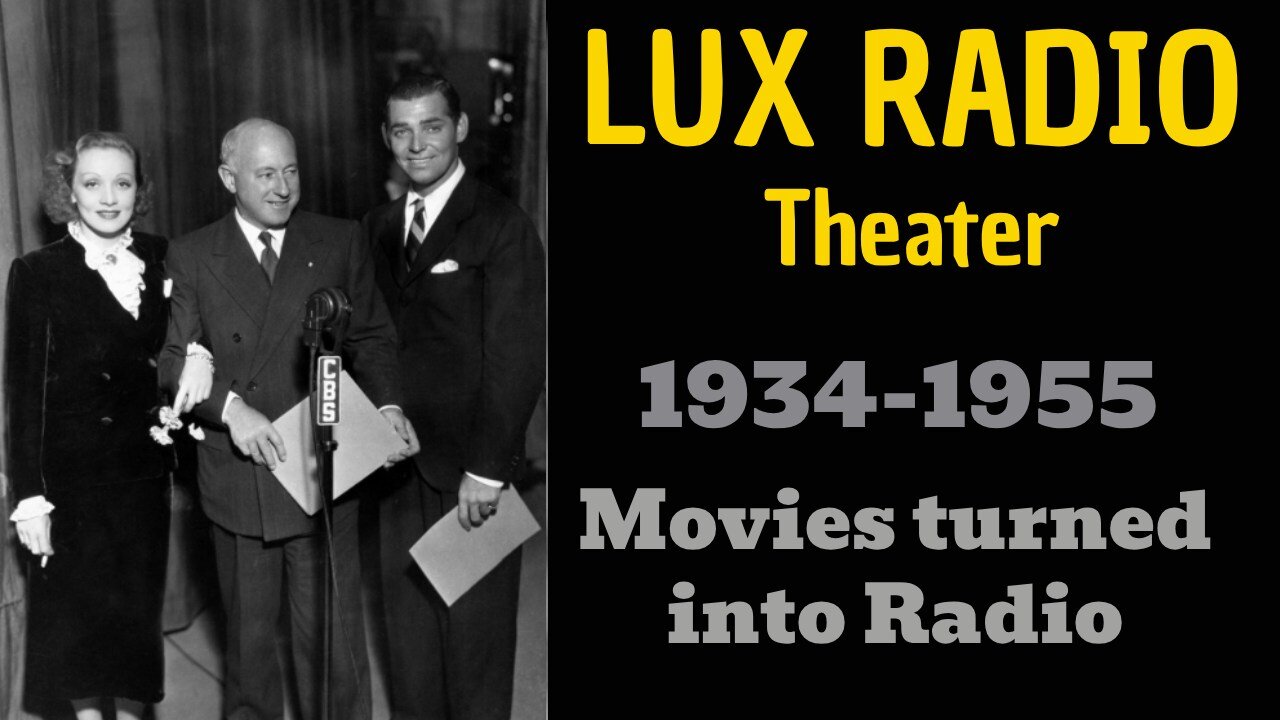Premium Only Content

Lux Radio 41-02-17 (295) Johnny Apollo (Dorothy Lamour, Burgess Meredith)
Plot
Bob Cain, Jr.'s stockbroker father, "Pop" Cain, is sentenced to prison for embezzlement of funds. Up until this time, the two were close, but Bob falls out with Pop over this situation and quits college to look for a job. He is unable to find one due to his father's notoriety. He finds work when he decides to use an alias, but is fired when this is discovered.
Later, gangster Mickey Dwyer, sentenced on the same day as Pop, is granted parole. Bob, disgusted with his father's lawyer, goes to see Dwyer's attorney, an old former judge named Emmett T. Brennan. Waiting outside Brennan's apartment, Bob, calling himself Johnny, meets the gangster's girlfriend, Lucky Dubarry. They chat and she is immediately attracted to him. Brennan arrives. Lucky pretends she knows Bob, and he, not wanting to disclose his identify at all, when asked by Brennan tells them both his full name is Johnny Apollo (taking the surname from the neon sign marquee visible through the window on the dance-club across the street).
Lux Radio Theatre was indisputably the biggest, most important, most expensive drama anthology program on radio. It ran from October 14, 1934 until June 7, 1955, then continued on television as Lux Video Theatre until 1957. In all, some 926 episodes were broadcast, providing a record of the most important entertainment events in American theatre and, later, film.
The show was first broadcast on the NBC Blue Network on Sundays at 2:30 PM. The show featured adaptations of successful Broadway plays when it was produced out of New York, such as Seventh Heaven, the first production starring Miriam Hopkins, Smilin' Through, Berkeley Square, Daddy Long Legs, Peg O' My Heart and Way Down East. On July 29, 1935, the show moved to Monday night at 9:00 PM on CBS, where it would stay until June 29, 1954. The show moved to Hollywood on May 25, 1936 with the production of The Legionnaire and the Lady, based on the film Morocco, starring Marlene Dietrich and Clark Gable. The audience for this production was estimated as high as 40 million. The show featured many of the most important films of the period, adapted to fit the 60 minute time slot. Some of the titles for 1939 should indicate the caliber and range of shows: Stage Door, Ceiling Zero, So Big, It Happened One Night, The Lives of a Bengal Lancer, Lady for a Day, The Life of Emile Zola, Tovarich, Only Angels Have Wings, The Prisoner of Zenda, The Awful Truth, Wuthering Heights, You Can't Take It With You, The Old Maid and Goodbye, Mr Chips. For its last season, (1954-1955), the show moved to Tuesday nights at 9 on NBC.
Lux Radio Theatre was always broadcast live, with a studio audience and a full orchestra accompanying the performance and providing musical transitions between scenes. As many film actors were used to numerous takes and not live performance, they sometimes suffered acute stage fright before the show. However, since most received $5,000 for their performance -- in addition to free publicity for upcoming pictures -- actors appeared in their original screen roles if they were available. Indeed, production would halt if necessary, on a film if performers were called to appear on Lux. When the actors were not available, others stepped in. The plays were assembled and rehearsed for a week, in sharp contrast to many other shows, which required a minimal of an actor's time. Regular players for the series included Jim and Marian Jordan, otherwise known as Fibber McGee and Molly. Hosts included Cecil B. DeMille (1936-1945), William Keighley (1945-1952) and Irving Cummings (1952-1955). Directors included Tony Stanford, Frank Woodruff, Fred MacKaye and Earl Ebi.
-
 LIVE
LIVE
Kim Iversen
3 hours agoJeffrey Sachs Just Exposed the Truth They Don’t Want You to Hear
2,175 watching -
 LIVE
LIVE
Glenn Greenwald
1 hour agoGlenn From Moscow: Russia Reacts to Trump; Michael Tracey Debates Ukraine War | SYSTEM UPDATE #413
2,265 watching -
 LIVE
LIVE
Slightly Offensive
1 hour agoGOV. RAMASWAMY? Vivek to import 1 BILLION INDIANS to OHIO | Nightly Offensive
490 watching -
 LIVE
LIVE
Wahzdee
4 hours agoSniper Elite Then Extraction Games—No Rage Challenge! 🎮🔥 - Tuesday Solos
936 watching -
 2:12:58
2:12:58
Robert Gouveia
4 hours agoSenator's Wife EXPOSED! Special Counsel ATTACKS; AP News BLOWN OUT
29.7K27 -
 55:07
55:07
LFA TV
1 day agoDefending the Indefensible | TRUMPET DAILY 2.25.25 7PM
4.89K6 -
 6:09:26
6:09:26
Barry Cunningham
10 hours agoTRUMP DAILY BRIEFING - WATCH WHITE HOUSE PRESS CONFERENCE LIVE! EXECUTIVE ORDERS AND MORE!
46.4K39 -
 1:46:37
1:46:37
Game On!
5 hours ago $2.51 earnedPUMP THE BRAKES! Checking Today's Sports Betting Lines!
19.9K1 -
 1:27:21
1:27:21
Redacted News
4 hours agoBREAKING! SOMETHING BIG IS HAPPENING AT THE CIA AND FBI RIGHT NOW, AS KASH PATEL CLEANS HOUSE
142K190 -
 1:08:28
1:08:28
In The Litter Box w/ Jewels & Catturd
1 day agoCrenshaw Threatens Tucker | In the Litter Box w/ Jewels & Catturd – Ep. 749 – 2/25/2025
77.7K46